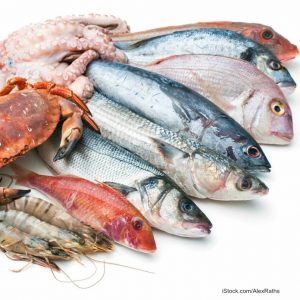A new map published by Oceana details the seafood fraud in the United States. Food Poisoning Bulletin has told you about seafood fraud before; it is a serious problem all over the world. Many consumers pay more for seafood than they should; species are sold masquerading as other species which costs consumers money and puts those with allergies at risk; and some of the species substituted for more pricey varieties can make you sick.
 The map lets you enter a location to discover fraud in your area. And information in the map tells you about Oceana studies. For instance, the largest study of seafood fraud to date found that 1 in 3 species is mislabeled. The agency has tested seafood and shellfish all around the country. They found that Atlantic cod is often mislabeled and sold as “orange roughy”, and “white tuna” is often actually escolar, a snake mackerel that causes intestinal distress in some people.
The map lets you enter a location to discover fraud in your area. And information in the map tells you about Oceana studies. For instance, the largest study of seafood fraud to date found that 1 in 3 species is mislabeled. The agency has tested seafood and shellfish all around the country. They found that Atlantic cod is often mislabeled and sold as “orange roughy”, and “white tuna” is often actually escolar, a snake mackerel that causes intestinal distress in some people.
In Boston, 18% of seafood samples are mislabeled. In the Houston, Texas area, nearly half of the seafood was mislabeled, which included all 10 samples from sushi restaurants Oceana visited. And in Portland, Oregon, 21% of seafood tested was mislabeled. There, lingcod is passed off as “red snapper”. Oilfish is sometimes sold as “red snapper”; it can also cause intestinal distress. And fish with high mercury levels, such as tilefish, king mackerel and shark, are often sold as other species, posing a threat to pregnant women and children.
The technical report that accompanies the map is more detailed. It found that not a single study found 0% fraud anywhere in the country. Ninety-one percent of the studies focused sampling at the retail end of the supply chain. The report also covers 67 peer-reviewed studies, seven government reports, and 23 news articles. The U.S. has the highest number of studies on seafood fraud.
The agency says that boat-to-plate traceability is necessary for both wild and farmed seafood to combat fraud and verify legality of the product in the supply chain. You can send a letter to your representatives, asking them to support the SAFE Seafood Act to help prevent this problem in the future.




